No Results Found
The page you requested could not be found. Try refining your search, or use the navigation above to locate the post.
Growing up in a black Baptist community, I didn’t hear much (if at all) about the Church Fathers. However, during seminary I realized that their influence was felt implicitly in the confessions we affirmed, hymns that we sang, the sermons preached, and the doctrines taught during Sunday school or new members’ class. Despite our general ignorance of their lives, the Church Fathers’ influence impacted our faith. These bishops, priests, deacons, and pious lay members of the ancient Christian Church contributed intellectually and pastorally to the development of both the East and Western Christian traditions (Orthodox, Catholic, and Protestant). They debated with both Christians and non-Christians over the meaning of Christianity’s central doctrines including the person and work of Jesus Christ, the Trinity, and the identity of the Church among others.
Many African-Americans, Christian and non-Christian, do not realize that some of the most influential of these theologians and pastors originated from northern Africa. Perhaps confusion about their origins begins within the Christian tradition itself. Despite being of North African descent, Clement, Origen, Athanasius, and Cyril spoke and wrote in Greek while Cyprian, Tertullian, and Augustine wrote in Latin. Hence, both the Orthodox and Roman Catholic Churches refer to them as the Greek and Latin Fathers. Moreover, in the history of medieval Catholicism, European painters depicted some of these Fathers as white European men. Many of these paintings like Botticelli’s painting of Augustine are featured in Western museums and their replicas in textbooks of church history and theology. Despite these shortcomings, African-American Christians must know that the theological and philosophical contributions that these Fathers bequeathed on the formation of Christian doctrine continue to impact our faith and lives.

Tertullian (Illustration Credit: Tim Ladwig)
Tertullian (c. 160 – c. 225) was born in Carthage, Tunisia. The son of a Roman centurion, Tertullian was the first prolific writer of Latin Christian literature, producing extensive works on a range of theological topics. Although not ordained into the priesthood, Tertullian contributed much to the Western Christian tradition. Tertullian was an apologist, defending the Christian faith against both pagans and heretics. Tertullian staunchly distrusted the use of pagan philosophy in understanding Christian faith. His famous rhetorical question, “What indeed has Athens to do with Jerusalem?,” captured Tertullian’s conviction that Christian faith is understood through the teachings of the Judeo-Christian scriptures alone. However, Tertullian made some use of philosophical categories, especially in his teachings on Jesus Christ and the triune God. During his debate with modalists, those who affirm that God exists as a single monad that manifests itself in three “modes” or operations without having eternal distinction between them, Tertullian coined the term trinitas to describe the Godhead and adapted other Latin terms to explain that God eternally exists as one “substance” (substantia) in three distinct “persons” (personae). Although later in life Tertullian defected to the heretical Montanist movement, his works left an indelible impression on future Church Fathers, including the brilliant theologian and biblical commentator Origen (c. 185 – c. 254).

Origen (Illustration Credit: Tim Ladwig)
Born in Alexandria, Egypt, Origen was the first theologian to expound Christian doctrine in a systematic way. Raised in a Christian home, Origen was educated by his father, Leonidas, who was martyred in the year 202 CE. A student of the Scriptures, Origen became a prominent Christian teacher in Alexandria and was a rigorous ascetic. He castrated himself and lived a frugal lifestyle. Moreover, Origen contributed to the Alexandrian school of allegorical interpretation of the Bible by writing extensive biblical commentaries. Origen also contributed to the development of the Trinitarian doctrine teaching that the Son and the Spirit were distinguished from the Father and yet existed eternally with the first person. He claimed that the Son is “eternally begotten” of the Father, the “source” or arche of the other two divine persons. Consequently, controversy arose through this claim that the Son and Spirit were subordinated to the Father, and the orthodox Christian Church later rejected it. Despite his major contributions to theology and biblical interpretation, Origen espoused views, such as the ultimate restoration of all things (Satan included!) and the pre-existence of the human soul that resulted in him being denounced as a heretic.

Athanasius of Alexandria (Illustration Credit: Tim Ladwig)
Athanasius of Alexandria (c. 296 – 373), an archdeacon and secretary to the bishop Alexander (d. 328) rose to acclaim by rigorously defending the full divinity of Jesus Christ and his co-equality with God the Father. Described as a very dark-skinned man of short stature, a hooked nose, and a reddish beard, Athanasius was known for his unrelenting convictions, especially his conviction that the eternal Son of God became human, famously penned in his most influential work On the Incarnation. Later Athanasius defended his position against the teachings of Arius. An Alexandrian priest, Arius (d. 336) taught that the Son, though divine, was a creature, thus sparking the so-called Trinitarian controversy of the fourth century. Arius coined the slogan which spread rapidly throughout Alexandria: “There was a time when [the Son] was not.” To counteract the spread of Arius’ doctrine, Athanasius argued that if Christ was not fully divine, he would have been unable to redeem humankind. Athanasius appropriated Origen’s doctrine of eternal generation and argued that the Son eternally exists and is equal with the Father while maintaining the Son’s distinction. The debate between Arius and Athanasius became so large that Emperor Constantine I convened a church council at his palatial estate at the Anatolian city of Nicaea in 325 CE. The first of seven ecumenical councils, the bishops ruled in favor of Athanasius’ position and rejected Arius’ teaching. The council affirmed that the Son was homoousias – “of the same substance” – with God the Father. This reinforced the orthodox position that only God could save humankind. The controversy continued on in the churches for several centuries; Athanasius endured five exiles by four different Roman emperors over a period of seventeen years. Eventually Athanasius returned to Alexandria where he died and was buried.

Augustine of Hippo (Illustration Credit: Tim Ladwig)
Arguably the most influential of the North African Church Fathers is Augustine of Hippo (c. 354 – c. 430) who single-handedly shaped the entire Western Christian tradition throughout the Middle Ages. A preeminent philosopher, bishop, and theologian, Augustine was born in Thagaste, an ancient city which is now Souk Ahras, Algeria. Augustine grew up in a household of a devout Christian mother, Monica, and a pagan noble father, Patricius, who later converted to Christianity. Augustine penned his journey of his life and his conversion to Christianity in the book Confessions, which is, arguably, the first biography written in Western literature. In this book, Augustine, in the form of prayer, describes his childhood and his education in Latin literature and philosophy, his self-described unruly personality, and his insatiable passion for women during his teenage years. As a young man, Augustine lived with a young woman who became his lover, and they had a son named Adeodatus. Despite being raised a Christian, albeit not baptized, Augustine joined a gnostic group called the Manicheans. After nine years, Augustine left the Manicheans and moved to Milan to teach rhetoric. It was there that he discovered Neo-Platonism and then the teaching of bishop Ambrose of Milan. In 387 CE Augustine converted to Christianity. In 391 CE Augustine was ordained to the priesthood and a year later became bishop of Hippo, now Annaba, Algeria. Augustine served as bishop until he died on August 28th in the year 430 CE shortly after the Vandals sieged Hippo.
Among Augustine’s other influential works include On Christian Doctrine, Enchiridion, and On the Trinity, a book which took Augustine twenty years to complete. Augustine’s fight with the Donatists over the meaning of the Church and his quarrel with the priest Pelagius over the doctrine of original sin and grace shaped the entire Western Christian tradition. Augustine’s other major work, The City of God, shaped the Western political philosophy. Furthermore, Augustine’s understanding of human nature has influenced, not without controversy, Western Christian teachings on human sexual relationships.
African-American Christians should understand the history of the Church Fathers for the purpose of understanding how Africans played a pivotal role in shaping Christian tradition long before the tragic event of the Atlantic slave trade. To be clear, the North African Church Fathers were not “black” in the modern sense. Indeed, these men were indigenous people of the African continent. Because of their own indebtedness to Greek and Latin philosophy, we do not have to agree with everything that the Church Fathers taught. However, we can celebrate their witness as fellow pilgrims on the journey of faith and as spiritual ancestors who “earnestly contended for the faith that was once delivered to the saints” (Jude 1:3).
Now, when I open the red “New” National Baptist Hymnal during worship, or when I study the Baptist confessions of faith for ordination, I sing and study with a new understanding and appreciation for what these men struggled to articulate. I also sing with amazement knowing that Africans significantly played a part in cultivating the entire Christian intellectual tradition. Despite my adolescent ignorance, I now reclaim these African Church Fathers as spiritual and intellectual ancestors who taught me not only to reverence the mystery of God through word, thought, and deed, but also to celebrate the African heritage of Christianity through the witness of a few faithful men of color.
For further reading, see:
Drobner, H. R., and S. S. Schatzmann, The Fathers of the Church: A Comprehensive Introduction. Peabody, MA: Hendrickson Publishers, 2007.
Oden, T. C., How Africa Shaped the Christian Mind: Rediscovering the African Seedbed of Western Christianity. Downers Grove, IL: InterVarsity Press, 2010.
Placher, W. C. A History of Christian Theology: An Introduction. Louisville, KY: Westminster John Knox Press, 1983.
Plantinga, R. J., T. R. Thompson, and M. D. Lundberg, An Introduction to Christian Theology. New York, NY: Cambridge University Press, 2010.
Jason Oliver Evans is a licensed Baptist minister. He graduated with a Bachelor of Science in Speech Communication from Millersville University of Pennsylvania. He also earned a Master of Divinity at Duke University and a Master of Theology from the Candler School of Theology at Emory University. His research interests cross the intersection of theology, ethics, and critical cultural studies. Evans is especially interested in the meaning of the Christian life and its relationship with sexuality, race, and gender in Afro-Christianity. He plans to pursue doctoral studies. Follow Evans’ blog, I Am a Son of God. Follow him also on Twitter at @joliverevans and Facebook.
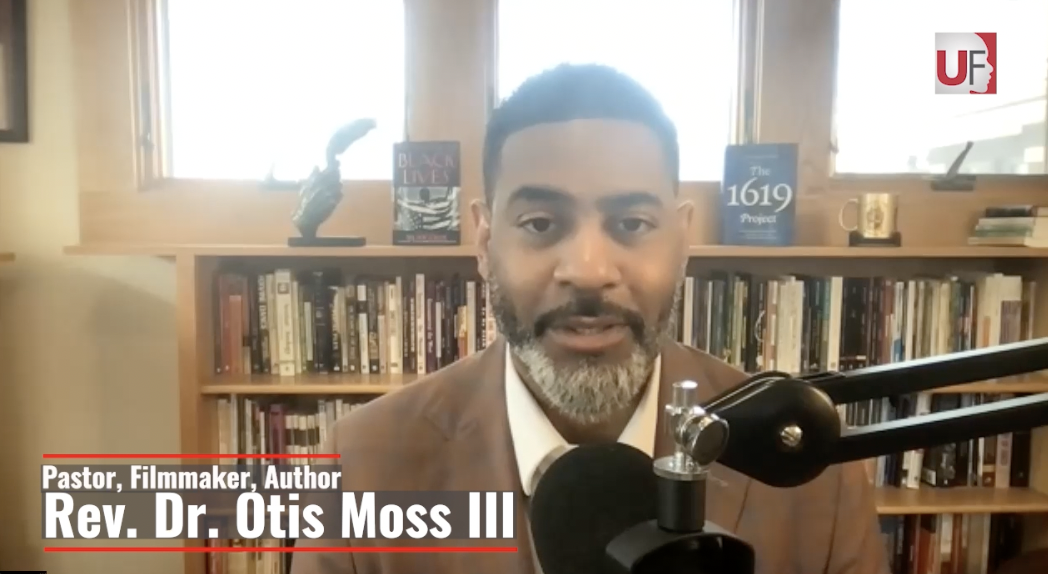
Rev. Dr. Otis Moss III is one of the most prolific prophetic voices of our generation. He is the Senior Pastor of Trinity United Church of Christ in Chicago, IL and his new book Dancing in the Darkness gives practical wisdom to face the darkness in our lives with prophetic hope. UrbanFaith editor Allen Reynolds sat down with his fellow HBCU and Yale alumnus, the one and only Rev. Moss to discuss his new book Dancing in the Darkness: Spiritual Lessons for Thriving in Turbulent Times. You can find the book everywhere books are sold and more about the book is below.
Rev. Moss serves as Senior Pastor of Trinity United Church of Christ which was the home church of President Barack and Michelle Obama. He has won multiple awards for his short film Otis’ Dream about his grandfather’s fight to vote in the United States. His parents were on the front line of the Civil Rights Movement, and he has been at the forefront of the fight for justice and civil rights in the 21st century. He calls himself a blues man committed to uniting love and justice in the tradition of Rev. Dr. Martin Luther King Jr. More about the book is below.
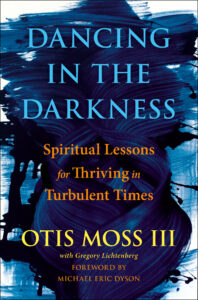
Once again, as Dr. Martin Luther King, Jr. first observed in the 1960s, it is midnight in America—a dark time of division and anxiety, with threats of violence looming in the shadows. In 2008, the Trinity United Church in Chicago received threats when one of its parishioners, Senator Barack Obama, ran for president. “We’re going to kill you” rang in Reverend Otis Moss’s ears when he suddenly heard a noise in the middle of the night. He grabbed a baseball bat to confront the intruder in his home. When he opened the door to his daughter’s room, he found that the source of the noise was his own little girl, dancing. She was simply practicing for her ballet recital.
In that moment, Pastor Moss saw that the real intruder was within him. Caught in a cycle of worry and anger, he had allowed the darkness inside. But seeing his daughter evoked Psalm 30: “You have turned my mourning into dancing.” He set out to write the sermon that became this inspiring and transformative book.
Dancing in the Darkness is a life-affirming guide to the practical, political, and spiritual challenges of our day. Drawing on the teachings of Dr. King, Howard Thurman, sacred scripture, southern wisdom, global spiritual traditions, Black culture, and his own personal experiences, Dr. Moss instructs you on how to practice spiritual resistance by combining justice and love. This collection helps us tap the spiritual reserves we all possess but too often overlook, so we can slay our personal demon, confront our civic challenges, and reach our highest goals.

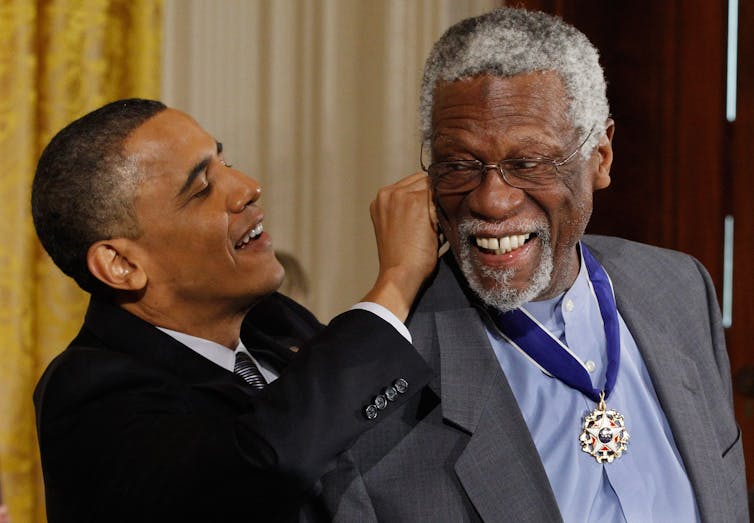
As the father of Black history, Carter G. Woodson had a simple goal – to legitimize the study of African American history and culture.
To that end, in 1912, shortly after becoming the second African American after W.E.B. Du Bois to earn a Ph.D. at Harvard, Woodson founded the Association for the Study of Negro Life and History in 1915.
More than 100 years later, Woodson’s goal and his work detailing the struggle of Black Americans to obtain full citizenship after centuries of systemic racism is still relevant today.
As dozens of GOP-controlled state legislatures across the U.S. have either considered or enacted laws restricting how race is taught in public schools, The Conversation U.S. has published numerous stories over the years exploring the rich terrain of Black history – and the never-ending quest to form what the Founding Fathers called a more perfect union.
Armed with a deep faith, Harriet Tubman is most famous for her successes along the Underground Railroad, the interracial network of abolitionists who enabled Black people to escape from slavery along secret routes in the South to freedom in the North and Canada.
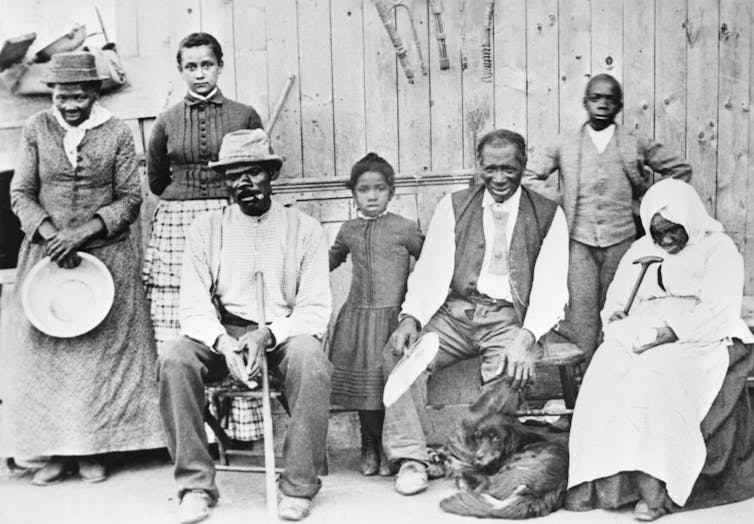
But Tubman’s activities as a Civil War spy are less well known.
As historian and Tubman biographer Kate Clifford Larson wrote, Tubman’s devotion to America’s promise of freedom endured, despite suffering decades of enslavement and second-class citizenship.
“I had reasoned this out in my mind,” Tubman once said. “There was one of two things I had a right to, liberty or death. If I could not have one, I would have the other; for no man should take me alive.”
As a scholar of race and colonialism, Kris Manjapra wrote that Emancipation Days – Juneteenth in Texas – are not what many people think.
“Emancipations did not remove all the shackles that prevented Black people from obtaining full citizenship rights,” Manjapra noted. “Nor did emancipations prevent states from enacting their own laws that prohibited Black people from voting or living in white neighborhoods.”
Between the 1780s and 1930s, over 80 emancipations from slavery occurred, from Pennsylvania in 1780 to Sierra Leone in 1936.
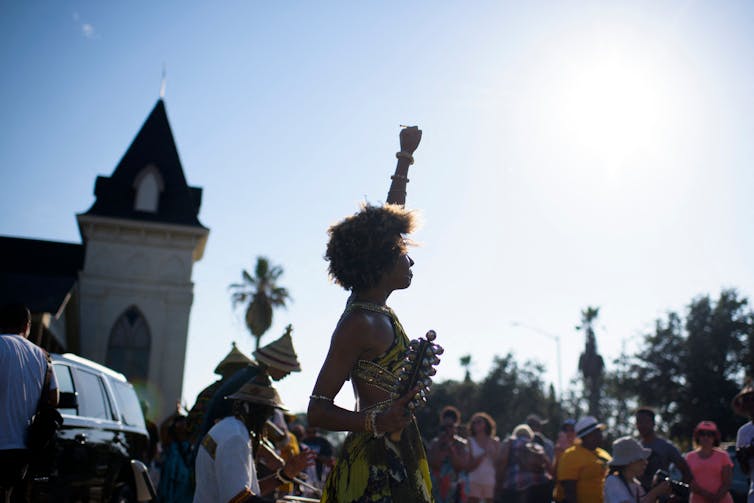
In fact, there were 20 separate emancipations in the United States alone from 1780 to 1865.
As director of the Lynching in Texas project, historian Jeffrey L. Littlejohn provided the very kind of analysis that Texas Gov. Greg Abbott and Republican legislators in Texas want to ban from public schools.
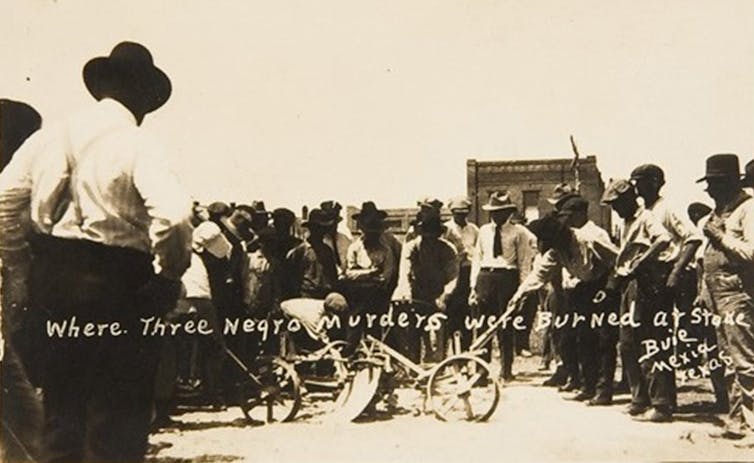
Among the many documents and relics Littlejohn has received, one package stood out. Inside was a family album of photographs filled with the usual images of memories – a vacation, a wedding anniversary dinner – but also, one of the lynching of a Black man.
During the Jim Crow era, lynchings occurred regularly in Texas – with 16 in 1922 alone.
But in 2021, the GOP-controlled state Legislature in Texas enacted a law prohibiting K-12 educators from teaching that “slavery and racism are anything other than deviations from … the authentic founding principles of the United States, which include liberty and equality.”
In other words, as Littlejohn wrote, “this interpretation holds that slavery, racism and racism’s deadly manifestation, lynching, did not serve as systemic forces that shaped Texas history but were instead aberrations.”
The photo album serves as a direct challenge to that interpretation.
In his book “Half American: The Epic Story of African Americans Fighting World War II at Home and Abroad,” historian Matthew Delmont explored the idea of Black patriotism and how many Black soldiers saw their service as a way to demonstrate the capabilities of their race.
Prompted by the Pittsburgh Courier, an influential Black newspaper during the 1940s, Delmont wrote that Black Americans rallied behind the Double V campaign during the war – victory over fascism abroad and victory over racism at home.

During the war, the Red Ball Express, the Allied forces’ transportation unit that delivered supplies to the front lines, was one example of such exceptional performance.
From August through November 1944, the mostly Black force moved more than 400,000 tons of ammunition, gasoline, medical supplies and rations to battlefronts in France, Belgium and Germany.
In his biography of Bill Russell, “King of the Court,” Aram Goudsouzian wrote that the NBA champion sought to find worth in basketball amid the racial tumult of the civil rights movement.
He emerged from that crucible by crafting a persona that one teammate called “a kingly arrogance.”
Russell, who died July, 31, 2022, was the NBA’s first Black superstar, its first Black champion and its first Black coach.
As a civil rights activist, Russell questioned the nonviolence philosophy of Martin Luther King Jr. and defended the militant ideas of Malcolm X and the Nation of Islam. He refused to accept segregated accommodations in the Deep South and recalled instances of police brutality during his childhood in Oakland, California.
“It’s a thing you want to scream,” Russell wrote. “I MUST HAVE MY MANHOOD.”
Editor’s note: This story is a roundup of articles from The Conversation’s archives.![]()
Howard Manly, Race + Equity Editor, The Conversation
This article is republished from The Conversation under a Creative Commons license. Read the original article.
Every Black History Month we see a million memes, quotes, and images of Black people who have played an important role in shaping the story and lives of black people in America. We have heard about Martin Luther King Jr., Harriett Tubman, Frederick Douglass, and Rosa Parks more times than we can count. If we’ve grown up with good black history education which is rare in these yet to be United States of America, then we might know Booker T. Washington or Maya Angelou. We know there is an active attempt to publicly whitewash black history as though the systemic destruction, repression, and marginalization of our history wasn’t enough. As a result it becomes more important than ever to teach and tell Black History.
But in an attempt to reclaim our history, let us not forget the key role faith played in the lives of so many of our black leaders. There is a reason why belief in God and practice of faith were so key in the lives of many (but not all) people we talk about during Black History Month. So let’s lift up the faith of our black heroines and heroes this month as we continue to live out our own faith. Below are just some notable examples of historical moments and key black leaders who were influenced by their faith.
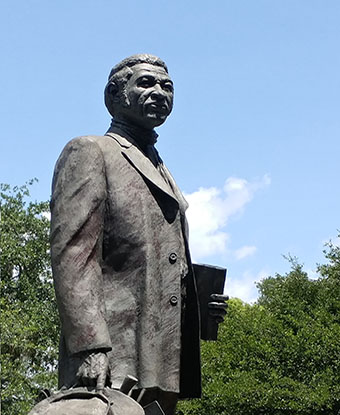 Denmark Vesey
Denmark Vesey
Denmark Vesey was an abolitionist and former slave who planned and organized an armed slave rebellion to free the slaves in Charleston, SC. Charleston was the largest slave trading port in the United States during the early 1800s. He was the slave of a ship captain who won the lottery and paid for his own freedom with his earnings, but was not able to pay for his family’s freedom. As a result he became intent on ending the institution of slavery itself. Vesey was a worshipper and small group teacher at the African Church which became Mother Emmanuel AME Church, and his faith informed his advocacy for abolition.
He was inspired by the Haitian revolution and planned to flee to Haiti with the freed slaves after the rebellion. He inspired other abolitionists such as Frederick Douglass, David Walker, and Harriet Beecher Stowe. It is well noted that the abolition of slavery was a result of the work of Christian abolitionists.
The Christianity of Vesey and David Walker after him did not advocate for passive waiting to slavery to end. As he read Isaiah, Amos, and especially Exodus he were convinced that armed rebellion could be used by God to bring freedom to enslaved Africans. He began to preach a radical liberation theology from the Old Testament almost exclusively as he prepared for rebellion. Denmark Vesey resurfaced as a popular figure in recent years in the aftermath of the horrendous shooting at Mother Emmanuel AME Church in 2016.
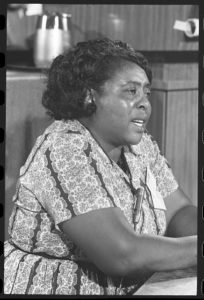 Fannie Lou Hamer
Fannie Lou Hamer
Fannie Lou Hamer was the founder and vice-chairperson of the Mississippi Freedom Democratic Party, which successfully unseated the all-white Mississippi delegation at the Democratic Party’s convention in 1968. This and other efforts earned her the title “First Lady of Civil Rights.”
In 1962, Fannie Lou became involved with the Civil Rights Movement when the Southern Christian Leadership Conference and the Student Nonviolent Coordinating Committee held a meeting in Ruleville, Mississippi. She and 17 others went to the county courthouse and tried to register to vote. Because they were African American, they were given an impossible registration test which they all failed. Fannie Lou’s life became a living hell. She was threatened, shot at, cursed and abused by angry mobs of white men including being beat almost to death by the police and imprisoned in Mississippi in 1963 for registering to vote.
Fannie Lou Hamer often sang spirituals at rallies, protests, and even in jail. Her faith in God is what she felt carried her through those difficult experiences. She quoted the Bible to shame her oppressors, encourage her followers, and hold her ministerial colleagues in the SCLC and SNCC accountable. She was a devout member of William Chapel Missionary Baptist Church, and let her faith permeate everything she did.
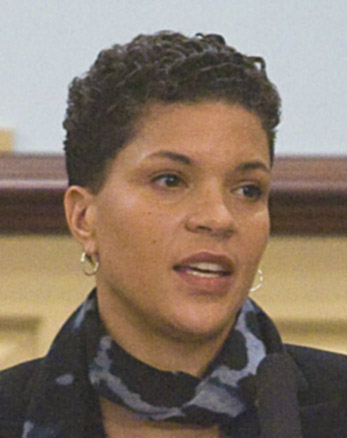 Michelle Alexander
Michelle Alexander
Michelle Alexander, JD is a civil rights lawyer and advocate, a legal scholar and the author of the New York Times best seller “The New Jim Crow: Mass Incarceration in the Age of Colorblindness.” The book helped to start a national debate about the crisis of mass incarceration in the United States and inspired racial-justice organizing and advocacy efforts nationwide.
Alexander performed extensive research on mass incarceration, racism in law and public policy, and racial justice to write her book published in 2010. She has lectured and taught widely on her work as a professor of law and religion at Stanford University, The Ohio State University, and Union Theological Seminary. The New Jim Crow became a foundational text for many of the reforms being advocate for by various organizations involved in the recent push for criminal justice reform and the movement for black lives.
Alexander was driven by her faith to advocate for justice system reforms, believing that God called her to it and seeing it as her reasonable service. Her faith drives her advocacy for justice for the marginalized, care and compassion for all people, and teaching. She feels as though her work in law and faith are inextricably linked, and that people of faith are poised to serve one of the most important roles in changing the system. She is currently a visiting professor at Union Theological Seminary in New York exploring the spiritual and ethical dimensions of the fight against mass incarceration.
https://www.nps.gov/people/denmark-vesey.htm
https://www.pbs.org/thisfarbyfaith/people/denmark_vesey.html?pepperjam=&publisherId=120349&clickId=3860507074&utm_medium=affiliate&utm_campaign=affiliate
https://www.nytimes.com/by/michelle-alexander
A Salute to Black Civil Rights Leaders, Richard L. Green, Chicago: Empak Enterprises,1987, p. 11
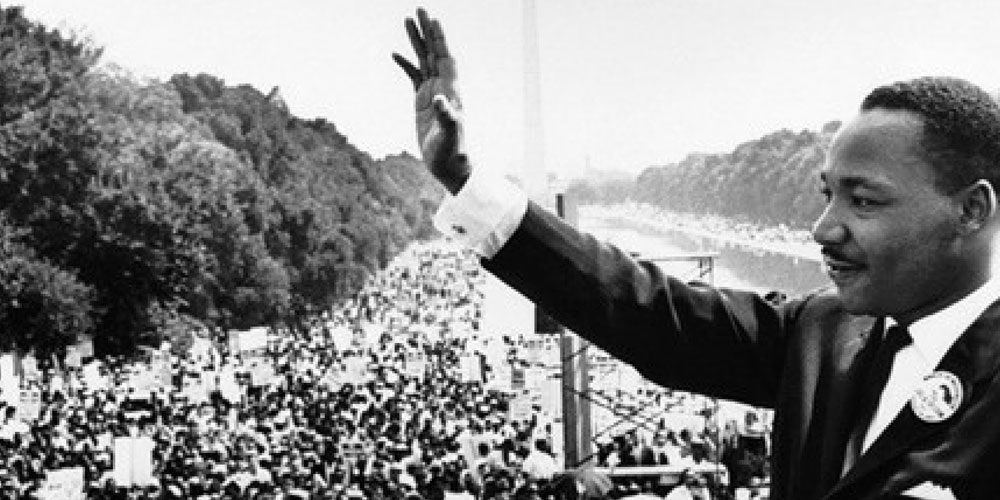
Video, courtesy of TIME
In celebration of Martin Luther King, Jr., we’ve compiled several of the stories we’ve published over the years about his life and ministry.
The page you requested could not be found. Try refining your search, or use the navigation above to locate the post.

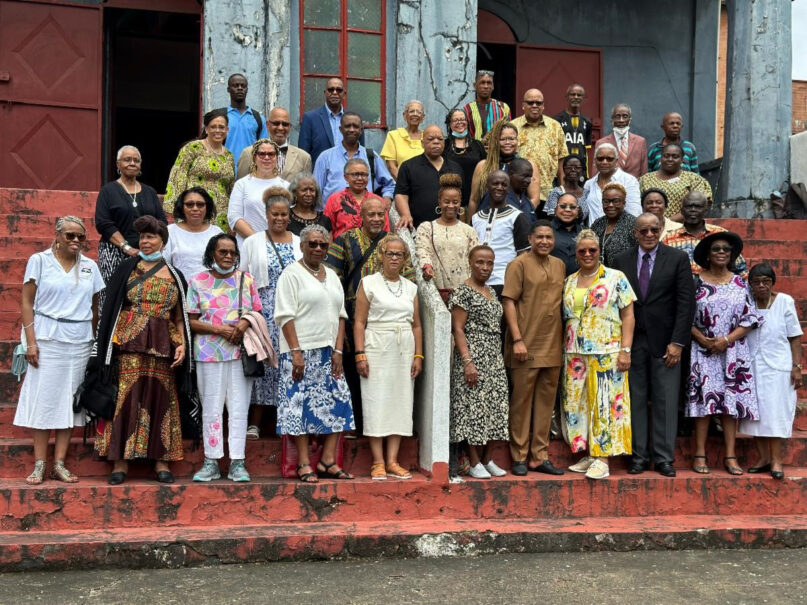
Providence, the oldest Baptist church in the West African country and the second oldest on the continent, was founded in 1822 by the Rev. Lott Carey, who had come as a missionary to the fledgling country and had brought a team of African American settlers home. Now, 200 years later, the Rev. Emmett L. Dunn, CEO of the Lott Carey Foreign Mission Convention, had brought a team of African Americans home.
I have traveled to several countries in Africa, and each one is imprinted on my heart in a special way. But hearing the stories of the African American settlers was cause to pause. I connected with the history of Liberia in a way I didn’t expect. I felt blessed beyond measure.
Landing in Liberia my spirit leaped like the baby in Elizabeth’s belly when greeting Mary, the mother of Jesus. The sights and sounds of Liberia greeted my senses, sending my head and my heart into overwhelming joy.
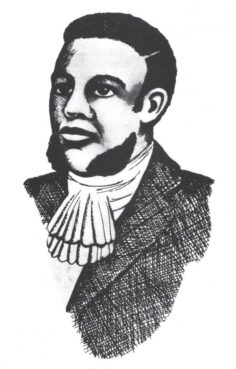
The Rev. Lott Carey. Photo courtesy of Creative Commons
In Liberia, I was at home. Home in the land of my ancestors on World Communion Sunday. Home, where a sense of “double consciousness” — a concept coined by W.E.B. DuBois to describe African Americans’ sense of dislocation from Africa and ourselves — liberated my thoughts and linked them to my theology in a free-spirited dance of deliverance.
It’s often said we must step back before we step forward. Walking in the footsteps of Lott Carey in the motherland afforded us the opportunity to do just that.
Born enslaved in 1780 in Charles City County, Virginia, Carey became a disciple of Jesus in 1807, purchased his freedom in 1813, and led the first Baptist missionaries to Africa from the United States in 1821.
After settling in Liberia, Carey and his pioneering missionary team engaged in evangelism, education and health care. He served as a missional and civic leader until his death in 1828.
Our pilgrimage relived aspects of this journey and the experiences of his team. We explored Providence Island, where Carey landed in Liberia in early 1822. Before we landed in Liberia, Dunn told us, “We expect that this journey into the past will bring home to us the love and sacrifice of those who walked this journey before us.”

The Door of Return at the Slave Castle in Cape Coast, Ghana. It was once dubbed “The Door of No Return,” signaling the last time enslaved persons would see their homeland. Courtesy photo
Our next stop in Africa took us nearly 1,000 miles east along the coast of the Assin Manso Slave River and the Cape Coast castle in Ghana, unofficially dubbed “the Door of No Return” by our Ghanian sisters and brothers, through which so many of our ancestors were shackled and shipped into the slave trade in the New World. It has become a portal for African Americans, pulling us back to Ghana.
Before walking to the Slave River, where my ancestors received their first bath after being captured and their last bath before being carted off to the Americas, we held a ceremony of protection over Lott Carey’s life. In my sanctified imagination, my African ancestors’ prayers came to fruition in the proclamation made that day. What was meant for evil, God had used for good some 400 years later.
How ironic is it? In a whitewashed slave castle used to destroy the African spirit, a group of spirited African Americans reconnected with a long-lost history, historically whitewashed in American culture and the church universal.
My Bible says, “Be steadfast and persevering, my beloved sisters and brothers, fully engaged in the work of Jesus. You know that your work is not in vain when it is done in Jesus’ name.”
It was in that spirit that the last leg of our journey in homage to Lott Carey ended with saluting our ancestors on the same shores where they passed, returning where no return was promised. In the Twi language of Ghana, “sankofa” is a word meaning “go back and get it.” We did.
(The Rev. Angelita Clifton is president of Women in Service Everywhere and an associate minister at Fountain Baptist Church in Summit, New Jersey. The views expressed in this commentary do not necessarily reflect those of Religion News Service.)